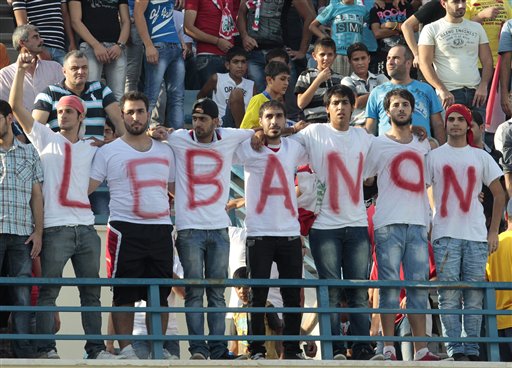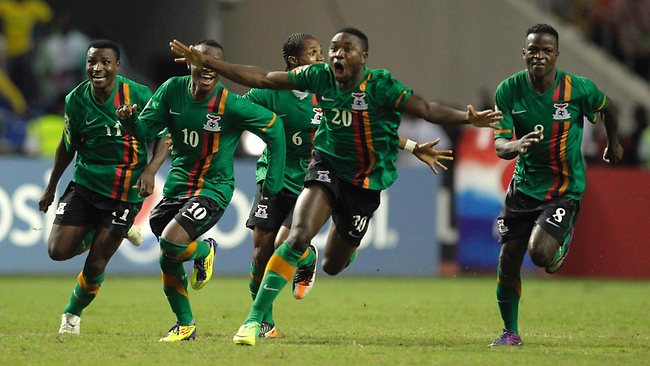
“Every Saturday was derby day in Lebanon,” noted James Montague’s football travelogue When Friday Comes, “where Sunni met Shia, Shia met Druze, Christian met Muslim. Violence was inevitable.” In an article in today’s New York Times, Montague revisits football in Lebanon. The article casts a spotlight on Theo Bücker, the German coach of Lebanon’s national team, on the eve of the biggest game in Lebanon’s history: a World Cup qualifier against the United Arab Emirates. Needing a single point to earn a place in the final stage of the Asian Confederation 2014 World Cup qualifying round, Lebanon rallied around the team.
I don’t care if someone is Christian or a Muslim,” Bücker said. “There are only good and bad football players, that is all.” He goes on to add with the confidence typical of outsiders: “The Lebanese are tired of all the problems of the past . . . They are happy that this is uniting them.” In the end, UAE won 4-2, but Lebanon still managed to move on to the final ten.
Read the NYT article here.
Further Reading:
Danyel Reiche, “War Minus the Shooting? The politics of sport in Lebanon as a unique case in comparative politics,” Third World Quarterly, 32, 2 (2011): 261-277.
Month: February 2012

Professional soccer in the U.S.A. took center stage at the Football Scholars Forum on Friday (Feb. 24). Ray Hudson not only braved the “football think-tank,” but also answered questions in the inimitable style he brings to broadcasting a Clásico on GolTV.
Using the documentary film Once in a Lifetime: The Extraordinary Story of the New York Cosmos, FSF discussed Cosmos and the NASL, as well as the representation and construction of history on film. “We had it all, man!” said Hudson looking back fondly to his playing days with the Ft. Lauderdale Strikers. The audio recording of the conversation is here.
FSF is holding its next online session on March 16, 2pm EST. Author David Goldblatt will be in East Lansing, Michigan, to discuss the second half of his book, The Ball is Round. FSF’s discussion of the first installment is here. For more information, contact Alex Galarza: galarza1[AT]msu[DOT]edu
Goal of the Week: Heel
By Simone Poliandri
Uruguayan striker Gaston Ramirez scores the second goal in Bologna’s 2-0 victory against Fiorentina in a Serie A match on February 21. Ramirez finishes the cross from teammate Marco Di Vaio with a heel strike that leaves no chance to the “viola” goalkeeper, capping a classic, well-executed fastbreak.
Goal of the Week: Coast to Coast
By Simone Poliandri
In the Lebanese Premier League, Al Nejmeh forward Hassan Al Mohammad controls the ball right outside of his team’s box, sprints across the field, and scores the winning goal with a superb long shot from midfield in the 89th minute. Al Ahed goalkeeper can only watch the football flying into the net, settling the score at 3-2, and sending the home fans into a craze. February 15, 2012.
Chipolopolo Champions of Africa

The room was tense. Zambia and Ivory Coast had played their hearts out in a goalless draw over 120+ minutes and now it came down to penalties. With me, watching a good stream on the big screen at work (on a Sunday), were three Zambians, a Kenyan, two American soccer aficionados, and my family.
Drogba had missed a penalty in regulation so the momentum seemed ever so slightly to favor the underdog Zambians. Chipolopolo prayed and prayed on the pitch, one of our Zambian friends commented wryly: “I didn’t know Zambians were so religious!”
As Zambia’s French coach Herve Renard would tell the media after the game, “I know we’re not the best, but we have a strength and force that animated our team.”
With the score tied at 7-7 in the shootout, Arsenal’s Gervinho shot wide and Sunzu stepped up for Zambia’s second chance to win.
Gooooooool!!!! The Zambians roared.
“I can’t believe it happened in my lifetime,” one of the Chipolopolo supporters exclaimed. We saluted the champions of Africa. Cell phones came out in an attempt to reach Lusaka.
The day after, not many people are at work, or so it seems . . . the Lusaka Times reports that “a thunderous welcome awaits the newly crowned Champions of African football” at Kaunda airport today.
With eight of the Zambian players based in South Africa, a national anthem based on Nkosi Sikelel’, and venerable liberation struggle ties, some of us delight in the fiction that a little piece of South Africa won as well.
That Chipolopolo became champions of Africa in Libreville, where the 1993 air crash killed the greatest Zambian team ever, made this triumph all the more special.
Viva Chipolopolo Viva!
Goal of the Week: Bicicleta Brasileira!
By Simone Poliandri
Alexandre Oliveira of Londrina displays his superb skills scoring the go-ahead goal against Iraty with a state-of-the-art bicycle kick in the Brazilian Campeonato Paranaense, the football league of the state of Paraná. Iraty then tied the game at 1, which was the final score of the game.
Death Match for the Egyptian Revolution?
Egypt’s worst-ever soccer disaster: at least 73 people died at a match in Port Said on Wednesday. “This tragedy is not simply a story of a match gone horribly awry,” writes James Dorsey at The Turbulent World of Middle East Soccer blog. “It will have important and wide-ranging political ramifications.” (Full post here.) The causes for the tragedy are unclear.
According to the New York Times, “Politicians, fans and Egyptian soccer officials all faulted the police as failing to conduct the standard gate searches to prevent fans from bringing knives, clubs or other weapons into the match.” Did the ultras — hard-core supporters — of home side El Masry and Cairo heavyweights Al Ahly walk into a trap?
Tensions between the ultras were high in the build up to the match. Taunts and scuffles in the terraces halted the game early on. El Masry won 3-1, but as the final whistle blew fans invaded the pitch and chased the Al Ahly players. Egyptian television footage (see above) shows undermanned law enforcement standing passively during the chaos.
“People here are dying, and no one is doing a thing. It’s like a war,” said Al Ahly star midfielder Mohamed Aboutrika; “Is life this cheap?” He then promptly announced his retirement from the professional game.
“The ultras whether they walked into a trap or initiated the Port Said violence have no doubt again dug themselves into a hole,” Dorsey observes (full post here). “This time round it will be a lot tougher to dig themselves out. They have played into the hands of the military and the police in dealing a lethal blow [to] contentious street politics as opposed to electoral politics and the horse trading associated with it.”
We at Footballiscominghome extend our condolences to the families of the victims.
***
Additional coverage of the Port Said disaster and its aftermath here.
This just in from Alex Galarza: NPR’s Andy Carvin is curating tweets live from Cairo @acarvin. Osama Diab at The Guardian also has a worthwhile story.
Read David Goldblatt’s “Egypt’s Political Football” here.
Further Reading: Paul Darby, Martin Johnes, Gavin Mellor, eds., Soccer and Disaster: International Perspectives (London: Routledge, 2005).